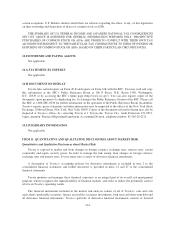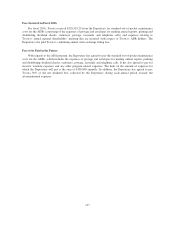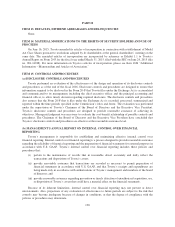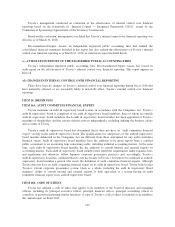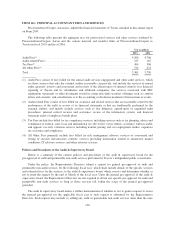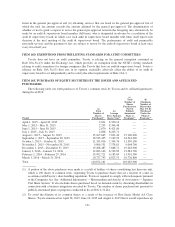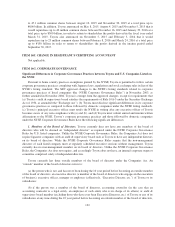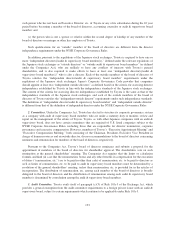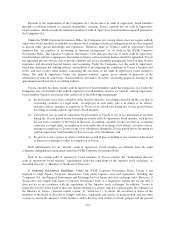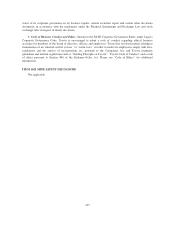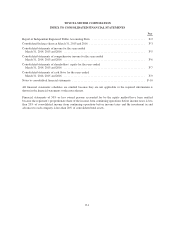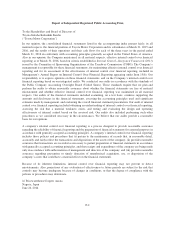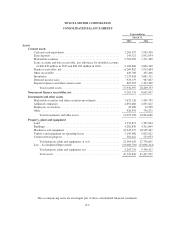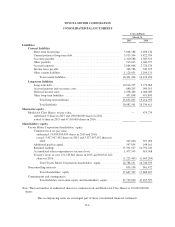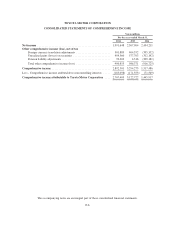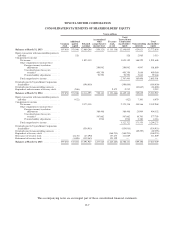Toyota 2015 Annual Report Download - page 139
Download and view the complete annual report
Please find page 139 of the 2015 Toyota annual report below. You can navigate through the pages in the report by either clicking on the pages listed below, or by using the keyword search tool below to find specific information within the annual report.Pursuant to the requirements of the Companies Act, Toyota elects its audit & supervisory board members
through a resolution adopted at a general shareholders’ meeting. Toyota currently has six audit & supervisory
board members, which exceeds the minimum number of audit & supervisory board members required pursuant to
the Companies Act.
Unlike the NYSE Corporate Governance Rules, the Companies Act, among others, does not require audit &
supervisory board members to establish an expertise in accounting or financial management nor are they required
to present other special knowledge and experience. Therefore, none of Toyota’s audit & supervisory board
members has “an expertise in accounting or financial management” as set forth in the NYSE Corporate
Governance Rules. The Japanese Corporate Governance Code indicates that one or more audit & supervisory
board members who have appropriate knowledge of finance and accounting matters should be appointed. Toyota
has appointed persons who are able to provide opinions and advice regarding management based on their broader
experience and discretion beyond finance and accounting. Under the Companies Act, the audit & supervisory
board may determine the auditing policies and methods of investigating the conditions of Toyota’s business and
assets, and may resolve other matters concerning the execution of the audit & supervisory board member’s
duties. The audit & supervisory board also prepares auditors’ reports, gives consent to proposals of the
nomination of audit & supervisory board members and makes decisions concerning proposals relating to the
appointment and dismissal of accounting auditors.
Toyota currently has three outside audit & supervisory board members under the Companies Act. Under the
Companies Act, at least half of the audit & supervisory board members must be an “outside” audit & supervisory
board member, which is any person who satisfies all of the following requirements:
(a) the person has never been a member of the board of directors, accounting counselor (in the case that an
accounting counselor is a legal entity, an employee of such entity who is in charge of its affairs),
executive officer, manager or employee of Toyota or its subsidiaries during the 10 year period before
becoming an outside audit & supervisory board member;
(b) if the person was an audit & supervisory board member of Toyota or any of its subsidiaries at any time
during the 10 year period before becoming an outside audit & supervisory board member, such person
has not been a member of the board of directors, accounting counselor (in the case that an accounting
counselor is a legal entity, an employee of such entity who is in charge of its affairs), executive officer,
manager or employee of Toyota or any of its subsidiaries during the 10 year period before becoming an
audit & supervisory board member of Toyota or any of its subsidiaries; and
(c) the person is not a spouse or relative within the second degree of kinship of any member of the board
of directors or manager or other key employee of Toyota.
Such qualifications for an “outside” audit & supervisory board member are different from the audit
committee independence requirement under the NYSE Corporate Governance Rules.
Each of the outside audit & supervisory board members of Toyota satisfies the “independent director/
audit & supervisory board member” requirements under the regulations of the Japanese stock exchanges, as
described above in “1. Members of the Board of Directors.”
4. Corporate Governance Guidelines. Unlike the NYSE Corporate Governance Rules, Toyota is not
required to adopt Japan’s Corporate Governance Code under Japanese laws and regulations, including the
Companies Act, the Financial Instruments and Exchange Law of Japan and stock exchange rules. However, if
Toyota does not comply with Japan’s Corporate Governance Code, it is required to explain the reasons why it
does not do so in accordance with the regulations of the Japanese stock exchanges. In addition, Toyota is
required to resolve at the board of directors matters relating to a system, which is required under the ordinance of
the Ministry of Justice (“internal control system” or “naibu-tosei”), to ensure the execution of duties of the
members of the board of directors to comply with laws, regulations and articles of incorporation, and any other
systems to ensure the adequacy of the business, and to disclose such matters resolved, policies and the present
134


